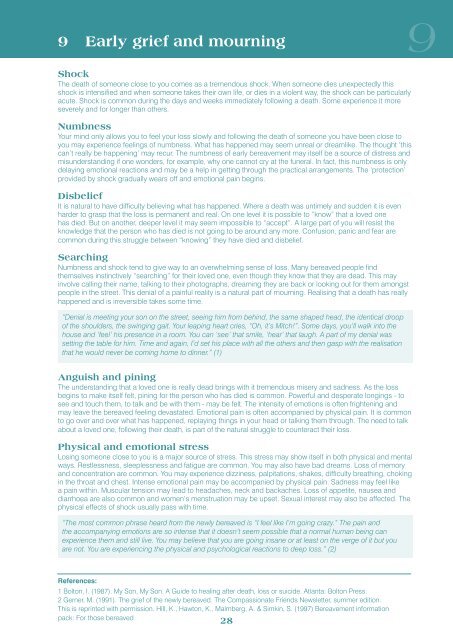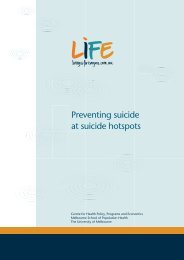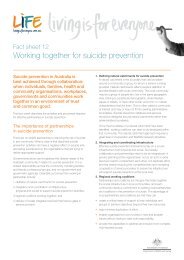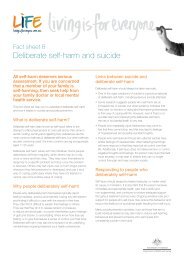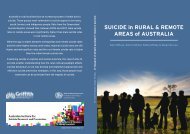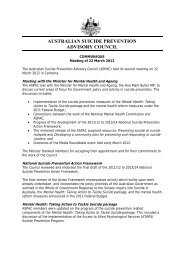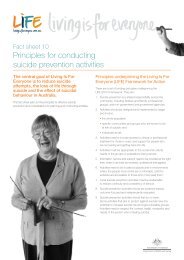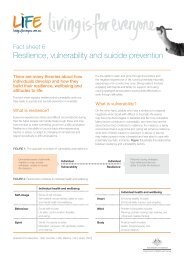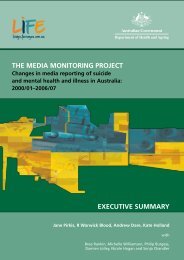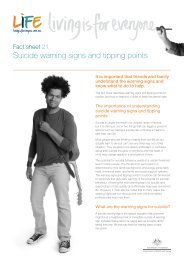Information & Support pack WA - Living is for Everyone
Information & Support pack WA - Living is for Everyone
Information & Support pack WA - Living is for Everyone
- No tags were found...
Create successful ePaper yourself
Turn your PDF publications into a flip-book with our unique Google optimized e-Paper software.
9 Early grief and mourning9ShockThe death of someone close to you comes as a tremendous shock. When someone dies unexpectedly th<strong>is</strong>shock <strong>is</strong> intensified and when someone takes their own life, or dies in a violent way, the shock can be particularlyacute. Shock <strong>is</strong> common during the days and weeks immediately following a death. Some experience it moreseverely and <strong>for</strong> longer than others.NumbnessYour mind only allows you to feel your loss slowly and following the death of someone you have been close toyou may experience feelings of numbness. What has happened may seem unreal or dreamlike. The thought ‘th<strong>is</strong>can’t really be happening’ may recur. The numbness of early bereavement may itself be a source of d<strong>is</strong>tress andm<strong>is</strong>understanding if one wonders, <strong>for</strong> example, why one cannot cry at the funeral. In fact, th<strong>is</strong> numbness <strong>is</strong> onlydelaying emotional reactions and may be a help in getting through the practical arrangements. The ‘protection’provided by shock gradually wears off and emotional pain begins.D<strong>is</strong>beliefIt <strong>is</strong> natural to have difficulty believing what has happened. Where a death was untimely and sudden it <strong>is</strong> evenharder to grasp that the loss <strong>is</strong> permanent and real. On one level it <strong>is</strong> possible to “know” that a loved onehas died. But on another, deeper level it may seem impossible to “accept”. A large part of you will res<strong>is</strong>t theknowledge that the person who has died <strong>is</strong> not going to be around any more. Confusion, panic and fear arecommon during th<strong>is</strong> struggle between “knowing” they have died and d<strong>is</strong>belief.SearchingNumbness and shock tend to give way to an overwhelming sense of loss. Many bereaved people findthemselves instinctively “searching” <strong>for</strong> their loved one, even though they know that they are dead. Th<strong>is</strong> mayinvolve calling their name, talking to their photographs, dreaming they are back or looking out <strong>for</strong> them amongstpeople in the street. Th<strong>is</strong> denial of a painful reality <strong>is</strong> a natural part of mourning. Real<strong>is</strong>ing that a death has reallyhappened and <strong>is</strong> irreversible takes some time.“Denial <strong>is</strong> meeting your son on the street, seeing him from behind, the same shaped head, the identical droopof the shoulders, the swinging gait. Your leaping heart cries, “Oh, it’s Mitch!”. Some days, you’ll walk into thehouse and ‘feel’ h<strong>is</strong> presence in a room. You can ‘see’ that smile, ‘hear’ that laugh. A part of my denial wassetting the table <strong>for</strong> him. Time and again, I’d set h<strong>is</strong> place with all the others and then gasp with the real<strong>is</strong>ationthat he would never be coming home to dinner.” (1)Angu<strong>is</strong>h and piningThe understanding that a loved one <strong>is</strong> really dead brings with it tremendous m<strong>is</strong>ery and sadness. As the lossbegins to make itself felt, pining <strong>for</strong> the person who has died <strong>is</strong> common. Powerful and desperate longings - tosee and touch them, to talk and be with them - may be felt. The intensity of emotions <strong>is</strong> often frightening andmay leave the bereaved feeling devastated. Emotional pain <strong>is</strong> often accompanied by physical pain. It <strong>is</strong> commonto go over and over what has happened, replaying things in your head or talking them through. The need to talkabout a loved one, following their death, <strong>is</strong> part of the natural struggle to counteract their loss.Physical and emotional stressLosing someone close to you <strong>is</strong> a major source of stress. Th<strong>is</strong> stress may show itself in both physical and mentalways. Restlessness, sleeplessness and fatigue are common. You may also have bad dreams. Loss of memoryand concentration are common. You may experience dizziness, palpitations, shakes, difficulty breathing, chokingin the throat and chest. Intense emotional pain may be accompanied by physical pain. Sadness may feel likea pain within. Muscular tension may lead to headaches, neck and backaches. Loss of appetite, nausea anddiarrhoea are also common and women’s menstruation may be upset. Sexual interest may also be affected. Thephysical effects of shock usually pass with time.“The most common phrase heard from the newly bereaved <strong>is</strong> “I feel like I’m going crazy.” The pain andthe accompanying emotions are so intense that it doesn’t seem possible that a normal human being canexperience them and still live. You may believe that you are going insane or at least on the verge of it but youare not. You are experiencing the physical and psychological reactions to deep loss.” (2)References:1 Bolton, I. (1987). My Son, My Son. A Guide to healing after death, loss or suicide. Atlanta: Bolton Press.2 Gerner, M. (1991). The grief of the newly bereaved. The Compassionate Friends Newsletter, summer edition.Th<strong>is</strong> <strong>is</strong> reprinted with perm<strong>is</strong>sion. Hill, K., Hawton, K., Malmberg, A. & Simkin, S. (1997) Bereavement in<strong>for</strong>mation<strong>pack</strong>: For those bereaved28


